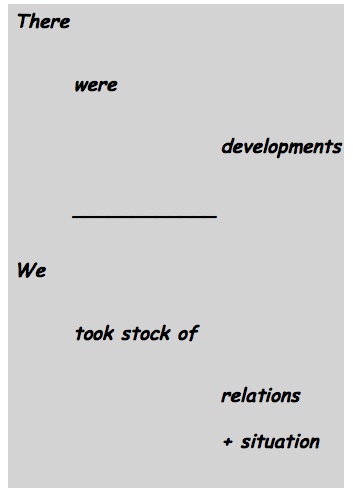“The first rule of consecutive interpreting is that the real work must already have been done when you start reading back your notes: the text, its meaning and the links within it, must have been perfectly understood.”
Jean-Francois Rozan
Everyone will tell you to note ideas and not words. But what constitutes an idea? Below is a simple introduction to recognizing ideas which can help in the early stages of learning consecutive interpreting.
| What is an idea?/ Well let’s ask ourselves what is the basic unit for communicating an idea in language.Answer: the sentence.And what arethe basic units of a sentence?Answer: Subject, Verb, (Complement, often but not always, an Object) |
This may sound simplistic but see how it works in the text below. This is a speech given by Chris Patten to the European Parliament on July 3rd 2000.
The exercise is then to ignore all the padding and additional information and to identify the essential Subject Verb (Object) units that make up the backbone of the speech and seperate them from one another…for example by hitting the ‘return’ key twice.
| In the areas for which I have some responsibility, there were also, as the Prime Minister has mentioned, some important developments at Feira. We took stock of the European Union’s relations with Russia and the situation there, including in Chechnya, in the light of the recent EU-Russia Summit, which I think was regarded as fairly successful. It is too early to judge President Putin’s economic programme; however, our basic message is that a sound programme will be vital to boost investor confidence. In Chechnya, there have, it is true, been some recent moderately positive developments in response to international and European Union pressure: for example the recent ECHO mission was able to take place and western humanitarian agencies have greater access to the area. The conflict nevertheless continues and we still have considerable concerns. In particular, we want to see much greater access for humanitarian aid agencies. We want to see genuinely independent investigation into reports of human rights abuses, and we want to see a real dialogue between the Russian government and the Chechens. |
The first unit of Subject Verb (Complement) is….
| S | V | C |
| There…. | were….. | developments |
Yes grammatically one can argue about the correctness of calling “there” the subject but you get my drift. It’s a long sentence but all of the rest of the information is secondary and has been tacked onto the basic framework which is ” There…….. were……..developments. “.
| S | V | C |
| We…. | took stock of… | relations (with Russia) and the situation there |
If we continue to do the same throughout the passage we might arrive at the following. Notice that the ‘sentences’ range in length from 4 – 21 words, but each contains only one S V O unit, only one idea.
| In the areas for which I have some responsibility, there were also, as the Prime Minister has mentioned, some important developments at Feira.We took stock of the European Union’s relations with Russia and the situation there, including in Chechnya, in the light of the recent EU-Russia Summit, which I think was regarded as fairly successful. It is too early to judge President Putin’s economic programme;however, our basic message is that a sound programme will be vital to boost investor confidence. On Chechnya, there have, it is true, been some recent moderately positive developments in response to international and European Union pressure: for example the recent ECHO mission was able to take place and western humanitarian agencies have greater access to the area.The conflict nevertheless continues and we still have considerable concerns. In particular, we want to see much greater access for humanitarian aid agencies. We want to see genuinely independent investigation into reports of human rights abuses, and we want to see a real dialogue between the Russian government and the Chechens. |
Try doing the same thing with a number of texts. Compare with your colleagues and see if you agree on the divisions.
How does this help in consecutive? Imagine each S V O group above as section of your notes. On one page of your note pad you have room for two sections of notes, in which you note the Subject Verb and Object diagonally across the page. The sections are seperated by a horizontal line.
Note the passage above in this way….

Now you are ready to try doing the same thing with the spoken word. Listen for the idea, the ‘who is doing what to who’. Note only that. At the initial stages it would be a mistake to try and get all the detail. Work on the essence first and the detail will come with practice.
You don’t, either, have to be very literal and take exactly the same words or elements as the speaker has used as their SVO. Indeed it is a demonstration of real analysis and understanding when you start noting the SVO groups with more freedom, for example you can note
- Note shorter synonyms.
- Note a different SVO group with the same meaning.
- Noting only two of the three elements in SVO.
- Make several short sentences out of one long one.